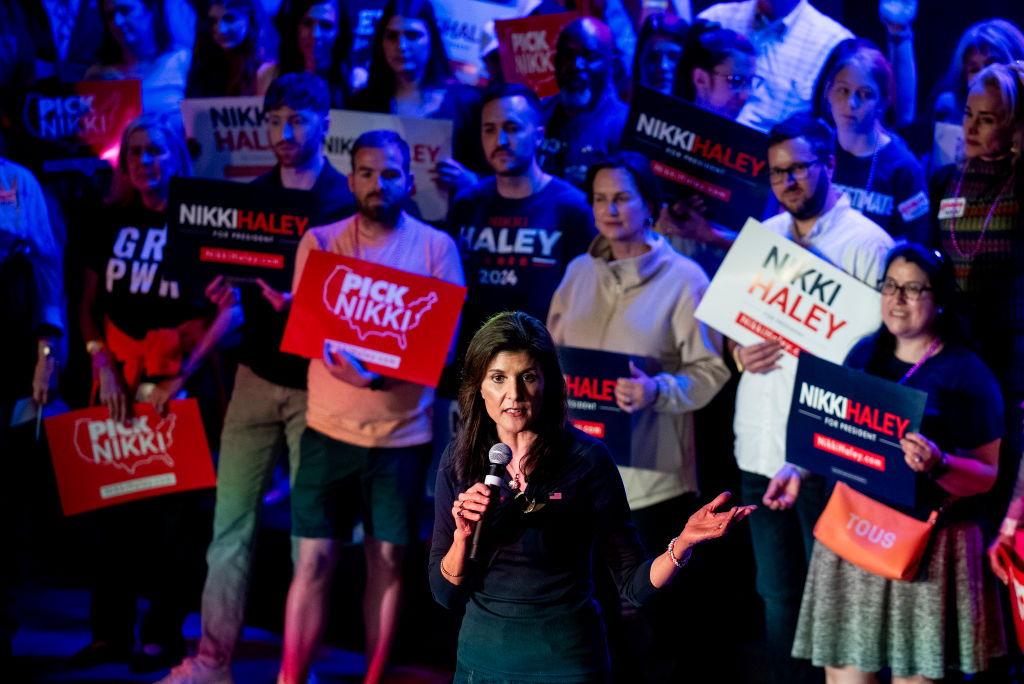The day Nikki Haley suspended her campaign for the Republican presidential nomination, Rufus Gifford, a national finance chairman for President Joe Biden’s reelection bid, invited the former South Carolina governor’s supporters to join the incumbent Democrat’s effort to defeat Donald Trump. Thomas Howes, executive director of a new group, The Reagan Caucus, immediately responded.
The two struck up a conversation, and soon after, Howes, who by day is a liberal arts lecturer at Princeton University, had organized a WhatsApp group chat with Gifford and eight other politically engaged Republicans who had backed Haley over Trump in the 2024 GOP primary. And so began the first direct, high-level courtship between a senior Biden campaign official and Republican activists and voters who pulled the lever for the former U.S. ambassador to the United Nations.
“Rufus was very kind and took our counsel very seriously. That impressed us,” Howes, whose group is registered as a super PAC with the Federal Election Commission, told The Dispatch this week in a text message exchange. “It was very clear Biden’s people are focused on persuading people like us.” As Gifford later posted on X: “My favorite new WhatsApp group I was just added to is called “‘Haley Supporters for Biden.’”
The Biden campaign declined to comment. But sources familiar with the president’s 2024 strategy said the campaign is in the process of “testing messages with disenchanted Haley voters” to determine which appeals are effective at wooing this cohort and how Biden might incorporate them into his overall reelection game plan. Concurrently, conversations between wealthy Biden donors and their Republican counterparts who contributed to Haley’s presidential bid have accelerated.
These politically active financiers tend to travel in overlapping circles and many of them have at least this much in common: They dislike Trump and oppose his return to the White House. Especially after the presumptive Republican presidential nominee declared Haley donors were not welcome in his coalition, Democratic insiders raising money for Biden believe they can make significant inroads with her financial backers, who under normal circumstances would, without hesitating, pivot to supporting the Republican nominee.
“We’re making clear they are welcome here,” said a Democratic operative who is involved in this effort but requested anonymity to discuss it publicly. “I’d anticipate a robust effort in that [finance] space in the months to come.”
These activities follow a course charted by Biden. On March 6, when Haley exited the race for the White House following a virtual sweep by Trump in the GOP’s Super Tuesday primaries the previous day, the president issued a statement complimenting her for “having the courage to run for president” and being “willing to speak the truth about Trump.” Biden welcomed Haley’s voters to join him.
“Donald Trump made it clear he doesn’t want Nikki Haley’s supporters. I want to be clear: There is a place for them in my campaign,” Biden said as part of a lengthy statement. “I hope and believe we can find common ground.”
Therein lies the challenge for Biden, according to Howes and Robert Schwartz, a senior adviser to Haley Voters for Biden, a super PAC formerly called PrimaryPivot and the latest group to emerge with the express goal of driving GOP support for the president. (In 2020, exit polls show Biden won 6 percent of self-identified Republicans and 14 percent of voters who consider themselves conservative—nationwide—while winning 51.3 percent of the vote overall and defeating Trump by 4.5 percentage points.)
In interviews, both Howes and Schwartz emphasized that the lion’s share of voters who voted for Haley in Republican primaries are traditional conservatives. They historically support candidates in general elections who believe in smaller government, tax cuts, significant reductions in government spending, and deregulation. On foreign policy, they support aggressive American leadership abroad—and many of them are socially conservative. Howes, for instance, described himself as “pro-life” on the issue of abortion.
So convincing such Republicans to vote for the Democratic incumbent will take more than warning them that Trump is a danger to democracy—a feature of Biden’s reelection message—or that the former president’s volatile temperament makes him unfit for the Oval Office.
“For genuine Haley-Republican voters who have voted Republican in the past, some of them—despite resentment toward the way the Trump campaign treated them—some will never vote for Biden; they are off the table,” said Schwartz. His group spent the GOP primary season urging non-Republicans eligible to participate in various contests to do so, in an effort to boost Haley over Trump, before transitioning to encouraging her voters to back Biden. Still, Schwartz said there is considerable upside for the president with this bloc.
“A number of them are persuadable,” he said. “The ones I’m talking to are persuadable.”
“It was very clear Biden’s people are focused on persuading people like us,” Howes added. “Some of us are already persuaded. His best chance to persuade others is probably to move to the center on social and fiscal matters.” This is one of the suggestions he passed along to Gifford, who, Howes said, was interested in hearing the perspective of Republicans entertaining support for Biden and learning what it would take for the president to close the deal.
Biden, of course, is a demonstrably liberal Democrat.
Government spending increased on his watch; climate regulations aimed at reining in the fossil fuel industry were tightened; illegal immigration spiked at the Mexican border after the president relaxed executive security actions implemented by the Trump administration; and Biden is running on a commitmentment to make access to abortion legal nationwide, again, in the aftermath of the 2022 Supreme Court decision in Dobbs v. Jackson Women’s Health Organization that struck down Roe v. Wade.
Biden’s best chance to make inroads with Haley Republicans might be on foreign policy.
They agree with Biden’s robust support for the North Atlantic Treaty Organization, providing military funding for Ukraine as the embattled nation fends off a Russian invasion, and the president’s sharp denunciations of Russian dictator Vladimir Putin. On these issues, the contrast with Trump is stark. However, Biden risks undermining his appeal to Haley voters with his increasing criticism of Israel as it wages war in Gaza to eliminate the deadly menace presented by Hamas in the wake of the terrorist group’s October 7 attack.
Haley Republicans, Schwartz said, were turned off by Senate Majority Leader Charles Schumer’s speech earlier this month calling for new elections in Israel to replace Benjamin Nentanyahu, the center-right prime minister who has a history of clashing with prominent Democrats. These voters were similarly repulsed by the Biden administration’s decision to have the U.S. abstain during a Monday vote by the United Nations Security Council on a resolution calling for a ceasefire in Gaza. The abstention allowed the resolution to pass, although it was nonbinding.
“They are not happy with what they perceive to be [Biden’s] pandering to the left,” Schwartz said. “That’s something not a lot of Haley voters are willing to accept.”
The Trump campaign doesn’t sound worried that voters who preferred Haley in the primary will mar the former president’s prospects. “Crooked Joe Biden’s disastrous policies of open borders, soft on crime, and record high inflation is the reason why he is getting whooped in the polls, especially with independents,” spokesman Steven Cheung said.
Prior to Haley’s exit from the race, Trump won every GOP primary and caucus in which both competed, with the exception of Vermont and Washington, D.C. The former president has earned 1,686 delegates to the Republican convention in Milwaukee, far more than the 1,215 he needs to win the nomination. Haley, in second place, has garnered 94 delegates. Yet despite Trump’s domination—she never truly threatened his status as the frontrunner—Haley amassed a significant percentage of votes in each of the contests in which she competed.
Indeed, roughly two weeks after Haley suspended her campaign, she received an average of 15.4 percent of the vote in Republican primaries in Arizona, Florida, Illinois, Kansas, and Ohio, revealing substantial dissatisfaction with Trump.
Normally, unhappiness with the frontrunner subsides after he becomes the presumptive nominee and the remaining primary candidates drop out. Votes against him in the remaining nominating contests usually plummet even with additional choices remaining on the ballot. That has not been the case this time around. Many Haley voters—more aligned in policy and temperament with Ronald Reagan, the 40th president, than the 45th president—simply do not feel welcome in the GOP by Trump or his loyal supporters.
This is the case partly because the former president, with rally crowds cheering him on, has said he wants to banish from the party prominent Republicans with whom many Haley Republicans identify, such as Mitt Romney, a senator from Utah and the GOP’s 2012 presidential nominee. “We’re getting rid of the Romneys of the world. We want to get Romneys and those out,” Trump said during a March 4 campaign gathering in Virginia.
Haley voters may yet “come home” and support the Republican nominee in November. That’s what usually happens.
But the level of discomfort Haley voters have with Trump and his movement of conservative populists suggest the former president could have lasting problems with a faction of Republicans he likely needs to defeat Biden. Trump’s response? The New York Times reports the former president has made no overtures to Haley or her voters. Haley, meanwhile, has declined to endorse the presumptive Republican nominee, saying it’s up to him to make the first move and woo her voters.
This presents a major opportunity for Biden, if he can seize it.
“It will take intense outreach effort from the Biden camp to show that they want to win these voters,” Schwartz said.









Please note that we at The Dispatch hold ourselves, our work, and our commenters to a higher standard than other places on the internet. We welcome comments that foster genuine debate or discussion—including comments critical of us or our work—but responses that include ad hominem attacks on fellow Dispatch members or are intended to stoke fear and anger may be moderated.